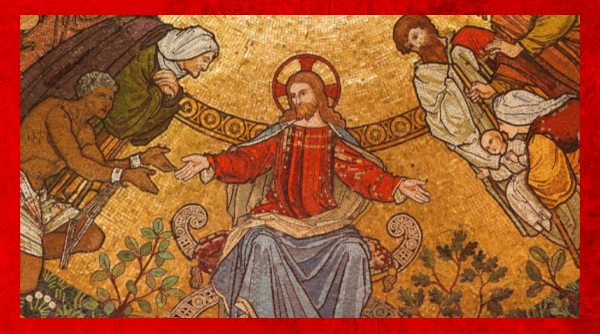Self-help vs. New Age Gnosticism

The cultural revolution of the 1960’s led to a movement in the 1970’s of mothers entering the workplace. In addition to developing the new norm of ‘substitute’ parenting through the establishment of day care businesses (rather than children being raised at home with their mother), this movement created other needs for both men and women. In particular, the 1980’s was the need for personal and professional development: the self-help movement. This spawned New Age Spirituality in the U.S., a movement that combined the New Thought movement of the 19th century with occultic and gnostic spiritualities of the past. As self-development involves acquiring knowledge and reasoning, New Thought also grew immensely. Thus, we saw (and still have) these two spiritualities (New Age and New Thought) very active and even mainstreamed today in schools, workplaces, and medicine. These are considered occultic as they depend upon (supposedly) hidden powers either within us or in the universe.
Self-development programs, books, trainings etc. often teach awareness of one’s own consciousness in order to tap into the collective consciousness of creation and ultimately divine wisdom, which sometimes is termed ‘God’. This is mainly accomplished by presuming the human person is divine so has power to manifest reality by his/her own efforts. Examples include The Power of Positive Thinking (Norman Vincent Peale) in which you manifest your desired reality (e.g. success, happiness) by your own ‘divine’ power of thinking. Tony Robbins (Awaken the Giant Within and other books) instructs followers to chant “I am a millionaire” to achieve financial goals. Other examples include the Protestant/New Age blend prosperity gospel, self-help guru Dr. Wayne Dyer’s Manifesting 101, Deepak Chopra’s “spiritual science”, Eckhart Tolle and The Power of Now, Paolo Coelho’s The Alchemist, and the Esalen Institute. And that’s just the short list! (BTW, if you have any books or videos from these ‘gurus’ in your home, you might want to burn them and see a priest for deliverance prayers. 😊)
But not all self-help programs are occultic. Self-development itself is good and necessary to our moral growth, both natural and spiritual. Some useful aids surfaced this past century such as the Clifton StrengthsFinder, the Myers-Brigg Type Inventory (MBTI), the DiSC Profile, the Big 5 personality test, and others. Meanwhile, in this century of Catholicism we’ve seen a revival of interest in the Temperaments, initially developed by Hippocrates in ancient Greece and embraced by Christians in the middle ages. The purpose of any of these is to gain awareness of your own inclinations and how those differ from other people. These are used in workforce & ministry development, family counseling, and personal development/life coaching.

What’s the point to all of this? We are seeking to know and understand ourselves and our God, responding to the innate desire for Him created in our soul. We want to get along better with the people around us, especially our loved ones. And we grow tired of our own faults and bad habits. Tools such as these give some explanation and put words to the intangible but felt ‘self’. It is important to not become ‘fixed’ into any certain typology lest you risk becoming fixated on it. These can be misused as new ‘tools’ for psychological self-protection, using the information to control others and orchestrate outcomes. Ultimately, these are all human-generated models that are intended to understand behavior, not to become part of our self-perceived identity. God wants us to let Him show us our real identity as His child, one that isn’t of human construct. So it is important to not approach Him with a script in your mind that “I’m a Choleric temperament” or “I’m an introvert according to my MBTI”, as this creates a barrier through which you filter His message of love to you.
Just as typologies and models are intended to alert us to our behaviors and perspective, these can also prevent us from the very growth we desire. In the normal course of everyday life, often our weaknesses manifest from overused strengths. It is a strength to be a directive, take-charge leader but when overdone that person can become a tyrant. Being collaborative with others is an excellent quality until it becomes an excessive need for cohesion (which usually results in compromising truth or excellence). It is a strength to be detail oriented but this easily devolves into micromanaging every detail not only in your own life but of those around you (much to their chagrin!). We all need to be good listeners to one another, seeking to see and hear Christ in the other. But it is a weakness if our reaction to what is heard is to shrink back in fear of speaking the truth (with love).
Now, examining the day and thinking through those behaviors you regret, you’ll likely see some of your strengths in action. Sitting with God in prayer over this, He will help you see the fears that cause you to overuse your strengths, or use them for the wrong purpose. Keep talking with Him, and you’ll uncover the wounds that gave birth to those fears. Remember that He will never lead you into any memory that He hasn’t already prepared you for, and He will shower you with grace throughout this time together. This is the process of healing, and true healing can only come from our benevolent God.
In contrast, none of this will happen if you examen your day saying, “I did that because I’m a sanguine temperament and open to others according to my Big 5 test results”.
Developing the habit of seeing overdone strengths in our unwanted behaviors can help us to see the same in the other person. It is helpful in both personal and work relationships. If the other person seems aloof, this might trigger rejection fears in us. We don’t see that their strength is focusing on the present task. They may need to balance this with being present to those around them. On the other hand, if the other person is demanding and abrupt, this might trigger conflict fear and avoidance. Our emotional reaction, then, prevents us from realizing that their directive personality and goal achievement is their strength. Many arguments can be mitigated when each person steps out of the emotions being manifested and instead redirects their focus upon the needs and goals of the issue challenging them.
None of this comes from hidden powers within us or the universe, or from stereotyping others (and ourselves) with categories of man-made models. It is looking at the other person as the unique and unrepeatable creation that they are. Personality models can be useful for some (but not exclusive) understanding. Our faith gives us the proper teaching of the makeup of the human person and how grace builds upon nature to transform it. When we let God transform us, the lives of those we love will change too. Engaging this simple practice, that of examining the day to see ourselves and others in their God-given strengths, can bring forth new life in Christ for us all.
Ad Majorem Dei Gloriam 😊
(Images: Same as You by Cottonbro Studios on Pexels; Heads by Jonathan Cooper on Unsplash)

Thank you for caring and sharing appropriately...
Consecrated to the Sacred Heart of Jesus through the Immaculate Heart of Mary. Except where noted, all design, writing and images ©2024 by Debra Black and TheFaceofGraceProject.com. All Rights Reserved. No part of this website may be reproduced, distributed or transmitted in any form or by any means, including downloading, photocopying, recording, or other electronic or mechanical methods, without the prior written permission of the publisher, except in the case of brief quotations embodied in critical reviews and certain other noncommercial uses permitted by copyright law. For permission or to report violations please email: thefaceofgraceproject@gmail.com
